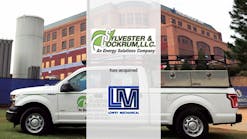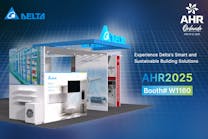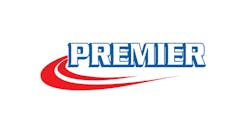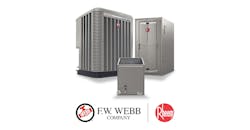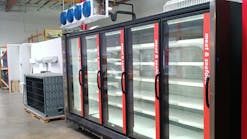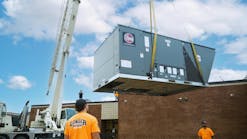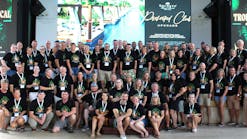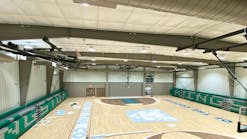The thrill of nurturing a business to a position of industry leadership is rivaled only by the satisfaction that comes with knowing it will continue for many years to come.
That’s how Dick Starr felt when his Cleveland, Ohio-based company, The Enterprise Corporation, was purchased recently by Campbell, Inc., a provider of commercial HVAC solutions in Northwest Ohio and southeast Michigan, based in Toledo.
Starr purchased Enterprise in 1977, and with the support of his wife Pat and many loyal and dedicated employees, it grew to became a leading provider of commercial heating, ventilation and air conditioning service, and a leading provider of building control systems. In 2011, we named it our Commercial Contractor of the Year.
Both Enterprise and Campbell, Inc. are Linc Service franchise companies — Enterprise since 1996 and Campbell, Inc. since 1982. Linc Service is a franchise brand of ABM Franchising Group, which is a portfolio of franchise networks that deliver mechanical and electrical service and preventive maintenance solutions to commercial, industrial and institutional buildings.
Starr is not quite ready to ride off into the sunset, and will continue to be involved in the daily functioning of The Enterprise Corporation.
We sat down with Dick Starr recently to talk about his career in controls, and the HVAC industry as a destination for new generations of workers in challenging times.
CB: It must be very satisfying to know you’ve built a company that others would like to acquire.
DS: Yes. And during the entire acquisition process, I was most concerned with making sure we hooked up with the right people. Because this is still a family business. All of our employees treat each other like family. We care about each other, and even our customers are like family. Our customers are also my friends. There is a caring here that we want to carry on and even enhance, however we can.
CB: During the earliest years of The Enterprise Corporation, what provided your strongest motivations for success?
DS: “The entrepreneurial culture is a paradox. On one hand you have a passion to be successful, and promote a feeling you have for what you do well. On the other extreme is the fear of failure. You ultimately achieve a balancing point. Success drives you, but at the same time you never want to disappoint the loved ones that are counting on you and trust you to make the right decisions, and the people working with you in the business, and customers.”
CB: What’s unique about specializing in building controls?
DS: “When controls are a passion in your life, to do them well, you have to understand systems. And if you understand systems you understand what makes things tick within the building: the heating, ventilating and air conditioning. The controls are the brains behind those functions, and they impact the ‘wellness’ of the building, and the health of the occupants. Once you grasp that, it takes you to another level.
“All of that was superimposed on top of my always being a problem solver. I love solving problems. There’s no more satisfying feeling in life than walking into a 10- or 15-year-old building that’s been plagued with problems, and being able to solve a problem nobody else could find. To be the person that finally makes the building ‘well’ is very fulfilling.”
CB: You’ve often taken active roles in two associations — Mechanical Service Contractors of America and Mechanical Contractors Association of America. Why?
DS: “The associations bring a group strength and education that professionalize our industry. Our trade organizations present programs and training that allow us to be better. Too many times this industry underprices itself; maybe it’s because there are so many cottage industries within it.
“The only way to make ourselves worth what we really are worth, is to allow our competition to be educated in some of the things we do and some of the things we’re successful with.
“Some competitors look at me like I’m crazy because I share my knowledge. You share knowledge, and help bring a rising tide. If they’re good, they’ll help us retain the values that are needed in this industry. It doesn’t bother me at all to share what’s been successful for us. If it’s something you want to dip into, great. The rising tide will help us all.”
CB: What are the main association offices you’ve held?
DS: “First, I was on the local “Labor/Management committee for the Mechanical Service Contractors Association ( MCA ) Cleveland. We would meet monthly to discuss issues on either side that was impacting productivity and management/customer satisfaction whether they were local union issues or any item coming from one of our MSCA Contractors. This could be anything from a labor disciplinary issue to a signatory contractor holding a labor employee back for any number of reasons. Our goal was to be fair and equitable to all parties. The committee was comprised of 3 MSCA Contractors, and 3 Union officials. Minutes of the meeting were handled by the MCA Cleveland Executive.
“Then, I served as chairman of the Cleveland MSCA chapter. This exposure resulted in my being the 1st Cleveland member to be nominated to a national position. I served on the national education/marketing committee first. Then I was named to the board, and ultimately became MSCA’s National Chairman in 2014.
"As National Chair, one of the things I’m most proud is introducing the concept of the MSCA ‘Everyday Hero’ Award. One night my wife, Patti and I were watching an episode of ‘CNN Heroes’, and I thought, why don’t we do something like this for our member companies? Let’s find the person nobody is talking about, who is unselfish and let the organization know about them. It’s one of the highlights today within the MSCA’s Annual Educational Conference.
"Another bright spot is starting the ‘School to Work’ program in Cleveland, which has become something of a national model. We work with local vocational schools to advance HVAC vocational students into the union trade… a local student who has a “ C “ or better average in his mainstream school, a “ B” or better in his vocational school, has 95% or better attendance, is drug-free and has the right attitude is recommended by his teacher to the Local no.120 pipefitter’s hall for acceptance between his Junior/Senior years of high School. If accepted, he or she is offered to local MSCA contractors for employment. When employed they are able to work alongside the “ A” Journeyman building and service trade pipefitter’s. It’s now a part of our collective bargaining program. This whole idea hatched from my love of baseball, and following the minor league system into the major league.
“Being a Baby Boomer myself, I could see the exodus of many in my generation who would need replaced. The MSCA chairmanship really gave me a platform to promote the concept.”
CB: During the time that you purchased the company, in 1977, it coincided with the beginning of the controls revolution.
DS: “Yes. When I started seeing the evolution of control technology my experience working for both a Fortune 500 building controls company coupled with also working for a Mechancial Contractor, it put me on the forefront to advantage those new technologies.
“I’ve always been an inquisitive person, which is how you solve problems; I always enjoy people who think ‘out of the box’. So, I cornered myself with ‘out of the box’ thinkers. I put myself in situations where the challenges were frequent, and most of those came from our customers who were ready for the next step. If you ask enough questions, analyze enough things, you finally come up with a solution. This analytics sometimes comes at the risk of profit which can be scary to some. Yet this ability to put your toe in the water with the next generation of things really resides which is why bigger companies are usually the ones to try new concepts. No matter what your size, however, I’ve tried associate with innovative thinkers and ride the wave.
“My father’s unselfish nature was to always make this world a better place for my brother… I always admired that quality and felt a need to carry on that torch.”
CB: What is the controls industry’s greatest advancement?
DS: “The integration of systems. Look at the NEST thermostat. It’s basically technology that brings the entire home onto one platform. I can remember thinking about these things in the 1970s, and wondering, why couldn’t we, with whatever technology we were using, bring in some of the other systems, such as lighting, security, and appliances.
“In terms of the commercial industry, Building Information Modeling (BIM) has had a big influence. Apps are making it easier for people to do things they couldn’t do before.
“Wearable technologies will have a strong influence. Going back to the wisdom of the baby boomers that are evacuating our industry: you will send a trainee up onto a roof, his headset will video the compressor and somebody back at the home office will help him diagnose and repair it. We will use those technologies to advance the current generation.”
CB: What must be done to help the high school educational system appreciate the value of careers in the trades?
DS: “It starts with what’s wrong with vocational education. I go back to the MSCA days when I was chairman. We put together a video called ‘You See More.’ We took a production team to the Cleveland Museum of Art and to a local hospital. At the museum, we showed works of art that are hundreds of years old, and described how HVAC technology maintains the humidity and the overall interior environment, which protects the priceless artwork.
“Then, we filmed an operating room at one of Cleveland’s University Hospitals, and showed how the critical the air changes per hour ( ACH ) and pressures are necessary to keep the environment sanitary and comfortable in the operating rooms.
“I think it’s a paradigm shift. We have to get that ‘Joe Butt Crack’ image out of the average person’s head. Show what this industry does to protect food processing environments, and hospitals, and workers in the chemical industry. All of how we protect the people and environments within these industries need to be shown to the right people. The secondary school boards of education is a good place to start.
“The problem this industry has, is that it’s technical. Not enough people can articulate what it is we do. I worked with enough guidance counselors to know we have to get to the boards of education. They’re the ones who are allocating the dollars within school systems for different programs.
“Our educational system has to go beyond reading, writing and arithmetic. We need to add vocational education into that system. There are so many students out there, who, if they’re just exposed to the trades, might find out it’s so much more self-fulfilling. To be a carpenter, electrician, heating and air conditioning technician or sheet metal mechanic; whatever the case might be. It requires getting that story told in the right circles and having one’s parents/role models support the message.
“This industry doesn’t have a voice. If I have an opportunity to be a voice for the industry, I want to do that."
CB: People don’t realize that so many of the HVAC industry’s best leaders never attended college.
DS: “I’m a college graduate. But, when I sat on the MCAA national board, there were 24 of us. Eight of the board members were former pipe fitters or sheet metal mechanics. They weren’t college grads, but they were smart people. And I was looking around the room, thinking that, the balance of those in the room were college educated, but we also learned this trade somehow, either through a parent, a family member, a colleague, or friend. Eight of those people were brought up through the vocational side of this business and were now running multi-million dollar companies. I thought to myself, ‘what’s wrong with vocational education?’ They’re running great companies, creating jobs, paying their taxes; tell me that’s not America!
“If that model works in our industry, why can’t it work in other places? Sure doctors, lawyers and engineers need a professional degree, but that is limited to a few professions. There are only so many industries that require a college degree. Technology today is reinventing the type of educational platform that requires a college education and the student debt that goes with it.
CB: How can smaller, less experienced commercial contractors get a foothold in controls?
DS: “The entire industry will see more of a controls mentality coming forward. It will behoove every contractor to adopt and embrace controls technology.
“The little guys have an advantage through their associations with their equipment suppliers. The equipment suppliers are embedding controls into their systems. The Carriers, the Tranes, and others all have their own systems, and they all offer opportunities to be trained in those systems.
“I would say to any contractor, if you can take advantage of understanding the controls systems associated with that piece of equipment, that is a way to break into it.”
